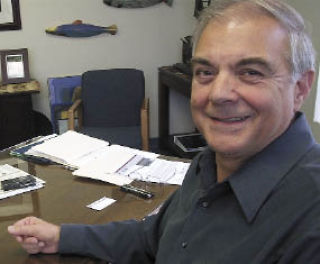Harris to retire
as company continues to excel
Charlie Harris is a good man orchestrating good deeds.
Like connecting people, putting them in a position to succeed in life, especially those living with disabilities.
Harris prides himself in doing just that.
“One of my favorite things in life is watching people grow to their potential,” said Harris, the outgoing CEO of Skills, Inc., a non-profit organization that has served the business and disabled communities around Auburn and the Puget Sound since 1966. “Here, I’m lucky to have a front-row seat for this on a daily basis.
“Sometimes we can help people and sometimes they just respond so positively to circumstances,” Harris added. “I particularly like to watch the progress of young people.”
From his Auburn facility, Harris has helped shape many success stories at Skills. Under his guidance, Skills has grown considerably in the amount of students and employees it has touched, offering employment and job training opportunities for those with disabilities and special needs. About 70 percent of Skills’ employees have disabilities.
While Skills grows, it has allowed the organization to hire more individuals with disabilities and provide new opportunities for personal and professional growth, Harris said.
“We have obligations to the disabled community, to our customers and to keep up,” Harris said.
But while the job isn’t finished, Harris’ run soon will be. He plans to retire before the end of the year, completing a stout eight-year run at Auburn.
“I just felt it is time,” said Harris, who has devoted a lifetime to service and duty,
a leader of large work forces.
“I found Skills and Skills found me, and it was a good fit,” he added. “I don’t know what I want to do … maybe pursue other non-profit work.”
Harris spent 20 years in the Army National Guard, 10 of which were active. He also ran an industrial distributorship in Seattle with 20 branches all over the West.
At Skills, he helped usher in program changes and growth.
For instance, the Skills’ outreach and high school internship programs have flourished.
In particular, the Skills’ aerospace internship program offers an educational job training program for high school students with disabilities and special needs, coordinated with local school districts. With one-on-one skills training and applied-classroom learning, Skills engages vocationally-minded students who might need an alternative to a traditional classroom environment and who are at risk for completing their education.
In this internship, students receive academic credit, stay on track toward graduation while learning marketable job skills.
“Some kids don’t respond well to a classroom education, so we’ll take on that responsibility,” Harris said. “We really have had tremendous success in first getting them graduated from high school because they see the importance of what they are doing.
“We started the program because he saw high school students who were not prepared to go to college,” Harris said. “They were left behind because of the college emphasis. A lot of kids are not ready to go to college when they are 18 years old. They need to be doing something to earn a living.”
The success at Skills is well known. The State Department of Vocational Rehabilitation, for one, lauded Skills’ model of training disabled people and its approach to basically splitting complex jobs.
Harris emphasized the importance of tailoring jobs with each worker. Skills offers a wide variety of good-paying jobs – from fabrication to assembly, distribution to packaging – to people of all ages and disabilities.
“And we look real carefully at the capability of each person and make sure that we’re not trying to give them too much,” Harris explained.
The company prides itself on the strong community ties it has developed over the last 40 years. Harris is happy to be a part of it.
“I just like people,” he said. “I just like the opportunity to meet and help many people, not just employees but their families as well.”



